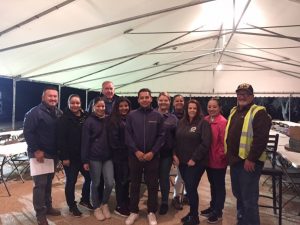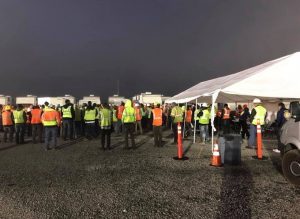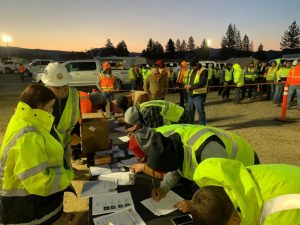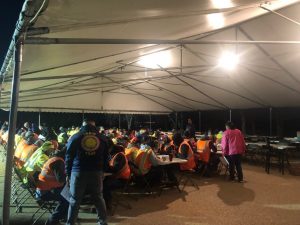desplácese hacia abajo para español
When PG&E launched its Accelerated Wildfire Risk Reduction plan in September of 2018, upwards of 1,500 line clearance tree workers from 29 different contractors flooded in to IBEW 1245’s jurisdiction to begin work on the massive project, which involves clearing all vegetation within 12 feet of the conductor on more than 7,000 miles of line in the highest-risk fire areas.
In any situation where a temporary workforce is brought in for a special assignment, there’s always a risk of those individuals being treated and compensated unfairly, but Local 1245 refused to allow that to happen. IBEW 1245 Business Manager Tom Dalzell got a commitment from the company that the work and associated resources would all be union, and Senior Assistant Business Manager Ralph Armstrong promptly secured a Project Labor Agreement (PLA) to ensure that these temporary workers received wages and protections that are commensurate with the full package enjoyed by the permanent tree trimmers already working in IBEW 1245’s jurisdiction.
Under the PLA, all the temporary tree workers would be given the opportunity to sign up with the union, and their employers would all become signatory to IBEW 1245. But organizing this onslaught of new workers doesn’t just happen overnight – it takes a time-intensive and highly coordinated effort on the part of IBEW 1245’s staff and organizing stewards.

Bilingual Organizing Stewards and IBEW 1245 Busines Reps traveled to base camps all over 1245’s territory to welcome new tree trimmers into the union. This photo was taken in Paradise, CA. Photo by Eileen Purcell
Armstrong worked with Business Rep Liz McInnis to lay the groundwork for identifying, welcoming and signing up the new tree trimmers. Together with Business Representatives Abel Sanchez, Ray Banfill, and Junior Ornelas, they briefed the current membership about the plan, while staff organizers Eileen Purcell, Fred Ross and Rene Cruz Martinez identified, recruited and trained 15 bilingual organizing stewards to help the business representatives welcome, educate and sign up the new tree members, most of whom are native Spanish speakers. And of course, the entire process wouldn’t be possible without the union’s office staff, including Muriel Moore, Peggy Proschold, Ashley Crase, Tanya Iniguez and Jennifer Edwards, who have handled the massive influx of clerical work seamlessly.
“This was and continues to be a massive undertaking, the likes of which I have not experienced in my 18 years with Local 1245,” said McInnis, who has helped to spearhead the entire operation. “It is overwhelming at times, but we adapt and push forward.”
A Warm Bienvenido

Vegetation management workers came together before dawn for a union orientation at the micro-base camp in Rohnert Park
Providing union orientations for all of the new tree workers has been anything but simple. As Organizer Eileen Purcell noted, “For many of the temporary workers – who hail from across the United States – membership in IBEW 1245 is their first union experience.”
That meant that each and every individual needed to be informed about the union and what it does, as well as the terms of the PLA, so they had a firm understanding of their rights. This proved to be more challenging than expected, due to the fact that there were remote base camp sites, language barriers, literacy issues, and time constraints to contend with – not to mention the fact that a substantial percentage of the tree trimmers and contractors come from right-to-work states, with little to no experience working in unionized environments, and a slew of negative presumptions about unions.

Business Rep Abel Sanchez and Organizing Steward Rachel Ramirez sign up tree trimmers in Oakhurst. Photo by Miguel Pagan
“I was surprised on how some of the new members did not know what a union was, and how hesitant they were to become members. But after talking to them and educating on what our union stands for, they were very surprised and interested in becoming members,” said prospective Organizing Steward Griselda Fernandez. “I felt proud to be able to speak to the new members in Spanish and be able to build trust between their work place and their union.”
“It’s a great experience any time you are bettering someone’s life,” said Lead Organizing Steward Nilda Garcia. “I take pride in being an active union member, and I expressed that when talking to the workers. It wasn’t hard for them to know that signing up was the best choice!”
After hearing about the union difference and receiving thoughtful answers to their questions, nearly all the tree trimmers were enthusiastic about signing up with the union. The organizing stewards may have thought that meant their work was done – but they quickly realized that many of the new members had a hard time understanding and completing the union membership forms, so they stepped up to assist their new union brothers.

Tree trimmers filling out their union membership forms at the base camp in Paradise.
“Honestly, I could totally relate with them, since my father to this day always has a difficult time filling out applications, whether they be in English or Spanish,” remarked Organizing Steward Luz Rivera. “It gave me great satisfaction that we were able to help sign up all these new members.”
“I enjoyed making a difference and letting them know the language barrier will not stop them from knowing what they are part of,” added Organizing Steward Melissa Fernandez.
With more and more tree trimmers coming in to PG&E territory every week, the organizing process is still ongoing, but the system put in place by Local 1245 has proven to be highly effective and will continue to give all tree trimmers working in 1245’s jurisdiction the same knowledge, opportunities, and protections.
“Our goal is to make sure that every tree trimmer who works in our territory knows that the union is here for them. We’re looking out for their safety, we’re ensuring they get fair pay, and we’ve got their backs if there’s an issue with the employer that they need help with,” said Senior Assistant Business Manager Ralph Armstrong. “They may only be here temporarily, but they are a part of the 1245 family now, and we’re doing everything we can to make sure they have the same rights and wages as our 1,800 other tree trimmers.”
Eileen Purcell, Liz McInnis and Rene Cruz Martinez contributed to this report.
Cuando PG&E inició su Plan Acelerado de Reducción de Riesgo de Incendios Forestales en septiembre de 2018, más de 1,500 trabajadores para al despeje de líneas eléctricas de 29 diferentes contratistas llegaron a la jurisdicción del IBEW 1245 para comenzar a trabajar en el gran proyecto, que consiste en despejar toda la vegetación que se encuentre a una distancia de 12 pies (3.6 m) o menos de los cables eléctricos en más de 7,000 millas (11,200 kilómetros) de líneas de transmisión en las zonas con mayor riesgo de incendio.
En cualquier situación en la que se trae mano de obra temporal para un trabajo especial, siempre hay un riesgo de que esas personas sean tratadas y compensadas injustamente, pero el Local 1245 se negó a permitir que eso sucediera. Tom Dalzell, Gerente de Negocios del IBEW 1245, logró un compromiso por parte de la empresa para que el trabajo y todos los recursos asociados se hicieran con la participación del sindicato, y Ralph Armstrong, Gerente Asistente de Negocios Senior, rápidamente obtuvo un Acuerdo Laboral para el Proyecto (PLA por sus siglas in inglés) para garantizar que estos trabajadores temporales recibieran sueldos y protecciones acordes con el paquete completo que gozan los podadores de árboles con contrato permanente que trabajan bajo la jurisdicción del IBEW 1245.
Bajo el PLA, todos los trabajadores temporales de las compañías de árboles tendrían la oportunidad de inscribirse en el sindicato, y sus empleadores serían signatarios del IBEW 1245. Pero la organización de esta avalancha de nuevos trabajadores no ocurre de la noche a la mañana. Toma mucho tiempo y es un esfuerzo que requiere mucha coordinación por parte del personal del IBEW 1245 y los delegados organizadores.
Armstrong trabajó con la Representante de Negocios Liz McInnis, para sentar las bases para identificar, recibir e inscribir a los nuevos podadores de árboles. Junto con los Representantes de Negocios Abel Sanchez, Ray Banfill, y Junior Ornelas, informaron a los miembros actuales sobre el plan, mientras que el personal organizador, compuesto por Eileen Purcell, Fred Ross y Rene Cruz Martinez, identificó, reclutó y capacitó a 15 delegados organizadores bilingües para ayudar a los representantes de las empresas a recibir, educar e inscribir a los nuevos miembros podadores, cuyo idioma natal, en la mayoría de los casos, es el español. Y por supuesto, todo el proceso no sería posible sin el personal de oficina del sindicato, incluidos Muriel Moore, Peggy Proschold, Ashley Crase, Tanya Iniguez y Jennifer Edwards, quienes manejaron a la perfección la afluencia masiva de trabajo administrativo.
“Esto fue y sigue siendo un enorme esfuerzo nunca visto en mis 18 años con el Local 1245”, dijo McInnis, quien ha ayudado a liderar toda la operación. “Es abrumador a veces, pero nos adaptamos y seguimos delante”.
Una Cálida Bienvenida
Ofrecer orientación sobre el sindicato a todos los nuevos trabajadores para el control de vegetación no ha sido sencillo. Eileen Purcell, organizadora, señaló: “Para muchos de los trabajadores temporales que vienen de todas partes de los Estados Unidos, ser miembros del IBEW 1245 es su primera experiencia sindical”.
Esto significa que tuvimos que suministrar información sobre el sindicato y lo que el sindicato hace, a todos y cada uno de ellos, así como información sobre los términos del PLA, para que comprendan claramente sus derechos. Esto resultó ser más difícil de lo esperado ya que había que enfrentar problemas como la existencia de campamentos en zonas remotas, barreras de idioma, problemas de alfabetización y limitaciones de tiempo. Además de que un porcentaje considerable de los podadores de árboles y contratistas provienen de estados con empleo a voluntad, con poca o ninguna experiencia trabajando en entornos sindicalizados, y con un montón de presunciones negativas sobre los sindicatos.
“Me sorprendió cómo algunos de los nuevos miembros no sabían qué era un sindicato y su indecisión para convertirse en miembros. Pero después de hablar con ellos y educarlos sobre lo que nuestro sindicato representa, estaban muy sorprendidos e interesados en convertirse en miembros,” dijo la candidata a Delegada Organizadora Griselda Fernández. “Me sentí orgullosa de poder hablar en español con los nuevos miembros y poder crear confianza entre su lugar de trabajo y su sindicato”.
“Es una gran experiencia mejorar la vida de alguien”, dijo Nilda García, Delegada Organizadora Líder. “Estoy orgullosa de ser miembro activo del sindicato, y así se los hice saber a los trabajadores. ¡No fue difícil para ellos entender que inscribirse era la mejor decisión!”.
Tras explicar la diferencia que hace pertenecer a un sindicato, y contestar preguntas, casi todos los podadores de árboles estaban entusiasmados de inscribirse en el sindicato. Quizás los delegados organizadores pensaron que habían terminado su trabajo, pero pronto se dieron cuenta de que muchos de los nuevos miembros tenían problemas para entender y llenar los formularios de inscripción del sindicato, así que intervinieron para ayudar a sus nuevos hermanos del sindicato.
“Sinceramente, los entiendo perfectamente, ya que mi padre, hasta hoy en día, tiene problemas para llenar formularios, ya sean en inglés o en español”, señaló la Delegada Organizadora Luz Rivera. “Me dio mucha satisfacción poder ayudar a todos estos nuevos miembros a inscribirse”.
“Disfruté marcar la diferencia y hacerles saber que la barrera del idioma no iba a impedir que comprendieran lo que significa ser parte del sindicato”, añadió la Delegada Organizadora Melissa Fernández.
Cada semana llegan más podadores de árboles al territorio de PG&E, por lo que el proceso de organización aún cointinúa, pero el sistema establecido por el Local 1245 ha demostrado ser muy efectivo y seguirá ofreciendo a todos los podadores de árboles que trabajan en la jurisdicción del Local 1245, los mismos conocimientos, oportunidades y protecciones.
“Nuestro objetivo es asegurarnos de que cada podador de árboles que trabaja en nuestro territorio, sepa que puede contar con el sindicato. Vigilamos su seguridad, garantizamos que reciban una remuneración justa, y pueden contar con nosotros si hay algún problema con el empleador y necesitan ayuda”, comentó Ralph Armstrong, Gerente Asistente de Negocios Senior. “Es posible que solo estén aquí temporalmente, pero ahora son parte de la familia del 1245, y estamos haciendo todo lo posible para asegurar que tengan los mismos derechos y salarios que nuestros otros 1,800 podadores de árboles”.
Eileen Purcell, Liz McInnis y Rene Cruz Martinez contribuyeron con este informe.